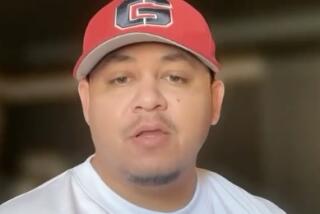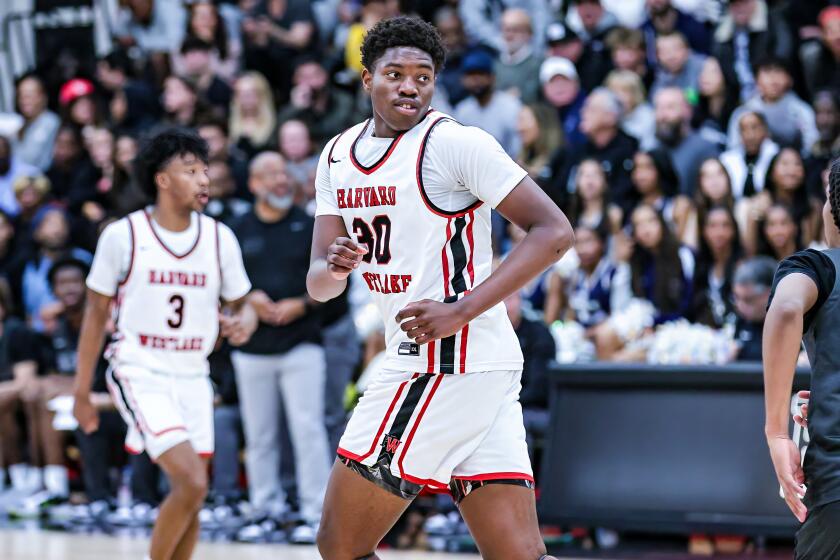For the Sake of Fatherhood, Garfield Coach Is Forsaken
- Share via
Amid the delicious and devastating whirlwinds that are East Los Angeles, one solid thing is missing today. The neighborhood doesn’t know it yet, but it will.
A mother will look at the clock. Ten-fifteen. A school night. Her teenage son has not returned from high school football practice. A slow-moving sedan bounces past in the streets.
He’s a good boy, but he’s still a boy, and she’s still alone.
The mother will reach for the phone, call the one man she knows will answer, the one man who at this ungodly hour will soon fill her doorway with the boy at his side, dragging him in from the dark.
Ten-twenty, and she will call the local football coach because he’s one man who will still act like a father.
She will call John Aguirre.
Who will politely remind her he can no longer help.
Because his school has decided it will not allow him to practice what he preaches.
The neighborhood doesn’t know it now, but another little bit of good has been chipped away with the unnecessary release of Aguirre from his football coaching duties at the landmark that is James A. Garfield High.
Why is he gone? He wanted to be a better father to his own son.
After spending eight seasons espousing the values of fatherhood to a team largely comprising players with absent dads--his exploits renowned throughout the Southland--Aguirre asked to take a one-year leave of absence to spend more time with son John during his senior year in high school.
Request denied.
Aguirre wanted to watch his son play wide receiver at Bishop Amat in La Puente, about 15 miles away. He wanted to watch him practice, drive him home, talk to him over dinner with his mom, be his friend during what may be their last year of living together.
One year, he wanted. Just that senior season. He would take care of Garfield by setting up an interim coaching staff with assistants who helped him reach the playoffs in each of his eight years.
“My last year with my boy before he goes to college,” Aguirre said. “I talk to my kids every day about being a good father. About being there. Now it was my turn to show them.”
Request denied.
So Aguirre left.
“I said, ‘I got to do what I got to do,’ ” Aguirre said. “They said, ‘Fine.’ I guess I got fired.”
Garfield quickly hired a new coach.
Aguirre quickly moved to remain in the game, volunteering to be a one-year linebacker coach at Bishop Amat until his son graduates. He will retain his Garfield teaching job, so his income will not change much.
The same cannot be said for his dreams. When is the last time a college football team hired a guy who walked away from a head coaching job in high school?
“That’s a risk I must take,” he said. “I have one year left with my boy. I want that year.”
Life moves on. The neighborhood moves backward.
A famous man, a big story, only if you happened to be there.
Aguirre told his team in its tiny, overheated weight room. Boys with tight haircuts and exaggerated glares--the same boys who helped lead the unlikely Bulldogs to the City Section semifinals this year--openly wept.
“I didn’t cry,” he said. “I told them, ‘Fellas, this is what I have been talking about. When you are a father, maybe you will do the same.’ ”
News spreads fast through the neighborhood, and slowly elsewhere, even when it involves a team and coach that last year were featured in a story on the first page of this newspaper.
About 49 of 2,200 boys in the school play football. None has earned a college football scholarship in 16 years. Most are too small and slow. Yet Garfield continues to field competitive teams.
Ten players from the team featured in last year’s story now attend Fresno State, none on scholarship but all of them there for the education, hoping that someone might see them on an intramurals field and give them a chance.
I only recently learned of the separation, and not through Aguirre, who found it amusing that anyone would want to write about it.
His son, John, laughed as well.
“My dad is just like a dad,”’ he said.
John talked about annual three-day camping trips in Yosemite with his father and a couple of Garfield players.
He talked about the junked BMW car that they have been restoring for two years.
“When we finally get it running after all that time, we have to go right to a BMW dealer to get more parts,” he said.
A famous man, a big story, only if you happened to be there.
Aguirre said that last spring he realized that the most important part of his son’s life was happening without him.
“I couldn’t make but a couple of his games. I could maybe drive him home from practice once,” he said. “A whole bunch was happening and I was with the other team.”
After Garfield’s loss in last fall’s City Section semifinals, Aguirre told a reporter of his plans without first consulting his new principal, Antonio Garcia.
A mistake.
In his ensuing memo outlining his plans to the principal, he did not mention his son. He said he wanted a leave of absence to pursue a master’s degree. Even after all this teaching about fatherhood, Aguirre was embarrassed to talk about it with a boss he didn’t really know.
“I would have worked on the master’s if I could have been assured of being head coach at Garfield after a year,” Aguirre said. “If I don’t have a son . . . I don’t just walk away from a head coaching job.”
Garcia said that the reason didn’t matter. He was clearly irked that he had heard of Aguirre’s plans through the newspaper, and was decidedly against the idea of an interim coach.
“For him to leave, we would have to have a commitment from someone to sit in his job only until he came back,” Garcia said. “That was difficult. It would be unfair to that new person.”
Aguirre said he had already worked out the details with his staff of mostly volunteers.
“Believe me, I wanted to work it out,” said Otis Yette, athletic director. “Guys like John do not come around very often.”
This only make sense, perhaps, if you could be John Aguirre when he was graduating from Garfield in 1972, living in an apartment over an Armenian bakery, still looking for his father.
The man left when Aguirre was about 5. He did not return until Aguirre was in his 30s, showed up at a wedding. “He said nothing to me. Nothing,” Aguirre said.
When his father lay dying of a stroke. Aguirre was called to his bedside. His father cried. Aguirre just stared. “I was a pall bearer at my father’s funeral, and we never even talked,” he said.
Five years later, a family grows stronger. A neighborhood grows weaker. This is not progress.
More to Read
Get our high school sports newsletter
Prep Rally is devoted to the SoCal high school sports experience, bringing you scores, stories and a behind-the-scenes look at what makes prep sports so popular.
You may occasionally receive promotional content from the Los Angeles Times.







